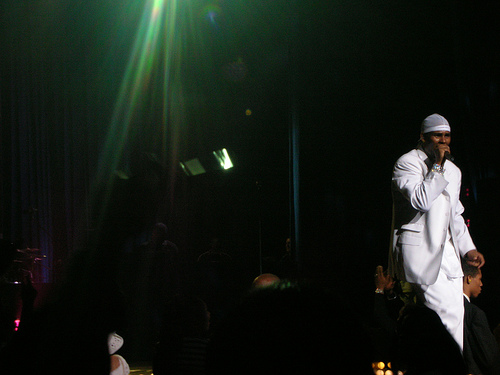R. Kelly is not perfect. He will tell you so himself. In his new book Soulacoaster: The Diary of Me, he shares a litany of faults: he’s never learned to read; he struggles to stay faithful to one woman; his ego occasionally gets in the way of his success. But whatever you call him—Kelly, Kellz, the King of R&B—you cannot deny that the man has a gift. It’s a gift straight from God, a point he reiterates throughout the memoir, and this particular non-believer is inclined not to doubt it. Witness his performance at Whitney Houston’s funeral earlier this year. He stands behind the pulpit, struggling to hold back tears. During the first verse of “I Look to You”, the lead single he wrote for Houston’s final studio album, his voice starts out shaky, but by the time he hits the chorus, it’s hard not to believe he is possessed by some kind of holy ghost. It’s inspirational, it’s mournful; it’s… a little bit sexy, which is weird. It’s R. Kelly.
There is plenty of fodder for the armchair psychologist in SOULACOASTER. When Kelly is eight years old, his childhood girlfriend drowns. In the cramped homes where he grew up in Southside Chicago, adults have sex in front of him, encouraging him to watch and take photos. As a child he is repeatedly molested by an older woman. And yet, Kelly never explores the possible connections between these incidents and his later alleged marriage to a teenage Aaliyah. He also largely glosses over his indictment on charges of (freaky) sex with a minor and the subsequent trial (he was formally acquitted of all charges in 2008). Instead, Kelly and his co-writer David Ritz keep the focus on his growth as an artist.
While Soulacoaster never fully gels as a narrative and its over-abundance of stock photos and screwy font changes is sometimes maddening, it’s no shock that R. Kelly’s strength lies in making music, not writing books. But Soulacoaster is still a fascinating artifact; approached as one half of an intense Q&A session with Ritz, it is a revealing look into the life of this complicated and hugely talented artist.
Timing-wise, at least, Soulacoaster is a kind of companion piece to the 2010 album Love Letter, and its follow up, Write Me Back, released this June. Both homages to the artists that inspired him, Love Letter and Write Me Back are virtuoso set pieces evoking Sam Cooke, Marvin Gaye, Stevie Wonder, and the many other musicians responsible for the “baby-making” music Kelly listened to his on his front porch as a kid. And yet despite the obvious pastiche, he makes the songs wholly his own. His performance of “When a Woman Loves” is all contortion and barely restrained vocals. It is easy to imagine the teenaged Kelly described in the book making hundreds of dollars in a few hours busking on the Chicago subway with only a Casio keyboard as accompaniment.
R. Kelly is the David Foster Wallace of radio-ready R&B. He is a prodigious, generous, deeply earnest artist striving for perfection—and unable, at times, to cope with the caprices of daily life.
Part of Kelly’s genius is that he can—and does—sing about minutiae and make it sound epic. On “Same Girl” his duet with Usher from 2007’s Double Up album, the men find themselves comparing notes on a woman they’ve recently met: Went to Georgia Tech? Yep./ Works for TBS? Yep. The details here are almost ridiculously banal. His songwriting is something like Hysterical Realism, the term coined by literary critic James Wood for a genre of fiction he compared to “a perpetual motion machine” in which details stack up upon details so much that “the conventions of realism are… exhausted and overworked.” R. Kelly is the David Foster Wallace of radio-ready R&B. He is a prodigious, generous, deeply earnest artist striving for perfection—and unable, at times, to cope with the caprices of daily life.
In a recent episode of Jimmy Kimmel Live, guest Gary Oldman, wearing a smoking jacket and deadpan expression, reads a passage from Soulacoaster to the audience’s hysterical delight. It’s easy to laugh at R. Kelly. The ever-expanding Trapped in the Closet “hip-hopera,” for instance, inspired numerous late-night and internet parodies. But don’t for a second believe that Kelly isn’t laughing too. In Soulacoaster he writes about Trapped in the Closet: “My biggest concern was about the rhyming. And that has had an interesting effect on the story. For example after I introduced the character ‘Bridget,’ it was only a matter of time before I came up with the character ‘Little Man’… No doubt I was inspired by the ‘stories’—the soap operas that my mother and grandmother obsessed over every day when I was growing up.” This is a musician who knows his genre, who brings it to the brink of sheer lunacy and then breaks the fourth wall to step in and tell the listener, “Now, pause the movie, cause what I’m about to say to y’all is so damn twisted—not only is there a man in his cabinet, but the man is a midget! Midget! Midget! Midget!” as if he himself is surprised and delighted by a turn of events that’s worthy of daytime-TV.
Kelly’s awareness of his public persona and the public perception of his work is part of what makes him a shrewd businessman. In reference to his years long court battle, he writes: “That was my strategy: beat the accusers, beat the prosecutors, beat the haters, beat them all – with love.” It’s part PR tactic, part religion. “They didn’t understand: If you were hating on me, I got you beat ‘cause I’m gonna keep loving on you.” As strategies go, particularly in the image business, it sounds better than most. Just like the man himself.
